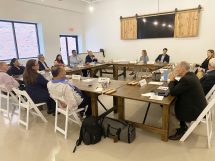FRANKFORT, Ky. (May 13, 2014) — The operators of a Kentucky-based pyramid scheme, which enrolled more than 350,000 consumers throughout the United States, Puerto Rico, and Canada in just its last four years, have been banned from multi-level marketing under a settlement with the FTC and the Attorneys General of Kentucky, Illinois, and North Carolina. The settlement also requires the operators to surrender assets totaling at least $7.75 million, which will be returned to consumers.
 In January 2013, the FTC and the states charged the Fortune Hi-Tech Marketing (FHTM) defendants with deceiving consumers by claiming they would earn significant income through selling various products and services if they signed up as FHTM representatives. In recent years, the scheme targeted Spanish-speaking and immigrant communities. Participants were required to pay substantial start-up costs and monthly fees to retain their positions with the company. The court subsequently halted the deceptive practices, froze the defendants’ assets, and appointed a receiver over the corporations pending a trial.
In January 2013, the FTC and the states charged the Fortune Hi-Tech Marketing (FHTM) defendants with deceiving consumers by claiming they would earn significant income through selling various products and services if they signed up as FHTM representatives. In recent years, the scheme targeted Spanish-speaking and immigrant communities. Participants were required to pay substantial start-up costs and monthly fees to retain their positions with the company. The court subsequently halted the deceptive practices, froze the defendants’ assets, and appointed a receiver over the corporations pending a trial.
“This was a classic pyramid scheme in every sense of the word,” Attorney General Jack Conway said. “The vast majority of people, more than 90 percent, who bought in to FHTM lost their money. Today marks the end of one of the most prolific pyramid schemes operating in North America.”
Kentucky’s investigation into FHTM started in 2010 after the Attorney General of North Dakota and the State Auditor of Montana took legal action against the alleged pyramid operation in their states and ultimately reached settlements with FHTM. The Texas Attorney General also subsequently settled pyramid allegations with the company. The Kentucky Office of the Attorney General had received about a dozen complaints regarding FHTM and issued subpoenas to the company in August of 2010 and August of 2011 to see if it violated Kentucky’s Pyramid Sales Act and/or the Consumer Protection Act.
The Kentucky Office of the Attorney General and the FTC were contacted by the North Carolina Attorney General and Illinois Attorney General regarding complaints from consumers in those states. The Kentucky Office of the Attorney General contacted the FTC because of the scope of the case and FHTM’s widespread operations in many states. The FTC’s financial analysts reviewed the documents and confirmed Kentucky’s initial findings. The FTC conducted further investigation and concluded that FHTM allegedly violated the FTC Act, as well as the Consumer Protection Acts and Pyramid Sales Acts of Kentucky, Illinois, and North Carolina.
The FTC and states agreed to jointly file the lawsuit against FHTM in January of 2013. The lawsuit claimed that consumers paid a $249 fee to join FHTM. In exchange for that payment, people could sell satellite television service, home security systems, beauty products, and other consumer goods and services. In promotional materials and at recruitment events, consumers were told they could “get rich” if they worked hard and sold products. Unlike legitimate multi-level marketing programs, FHTM distributors had no incentive to sell products. For example, the distributors only received pennies for selling multi-year service contracts and received substantial payments for every new FHTM member they signed up. FHTM’s promotional presentations and materials focused almost entirely on recruiting new members rather than selling products.
After conducting its own investigation, the court-appointed receiver determined that FHTM’s main business was recruiting new members and not selling products and services as it claimed, and confirmed the allegations made by the FTC and the states. The overwhelming majority of participants – more than 98 percent – lost more money than they ever made. At least 88 percent of consumers did not even recoup their enrollment fees. To the extent that consumers could make any income, it was mainly for recruiting other consumers into FHTM’s scheme. More than 81 percent of the payments to participants were based on recruiting new members and not for the sale of products or services. Not surprisingly, at least 94 percent of consumers did not renew their membership after their initial year.
In addition to the multi-level marketing ban, the settlement order permanently prohibits Thomas A. Mills, Fortune Hi-Tech Marketing Inc., FHTM Inc., Alan Clark Holdings LLC, FHTM Canada Inc., and Fortune Network Marketing (UK) Limited from misrepresenting material facts about any product or service, including claims concerning how much money consumers can earn. The order also bars the defendants from selling or otherwise benefitting from customers’ personal information, failing to properly dispose of customer information, and collecting any additional money from customers. During the course of the litigation one of the original defendants, Paul C. Orberson, died.
The order imposes a judgment of more than $169 million, which will be partially suspended when the defendants have surrendered certain assets with an estimated value of at least $7.75 million, including assets of Orberson’s estate. Once the payment is received, the FTC will coordinate a restitution plan for consumers. The full judgment will become due immediately if the defendants are found to have misrepresented their financial condition.
Mills and The estate Paul Orberson issued this statement about the settlement: “After many months of discussions and negotiations, we are pleased to have this matter resolved. The destruction of a decade old business and the subsequent health challenges and passing of Paul Orberson made settlement an inevitable path to resolution. We deny all of the allegations made by the government in this case. In order to avoid the additional emotional stress and costs of likely years of litigation, we felt it in our best interests and the interests of others to put this behind us and settle this matter. We wish to thank the many individuals and companies that have given us an outpouring of support during this challenging time. We are grateful for your expressions of support and generosity of spirit.”
The settlement resolves all of the FTC’s claims against the defendants, as well as the claims brought by the Attorneys General of Illinois, Kentucky, and North Carolina.
The commission vote approving the proposed stipulated order was 4-0. The order was entered by the U.S. District Court for the Eastern District of Kentucky, Central Division at Lexington.




















Add Comment